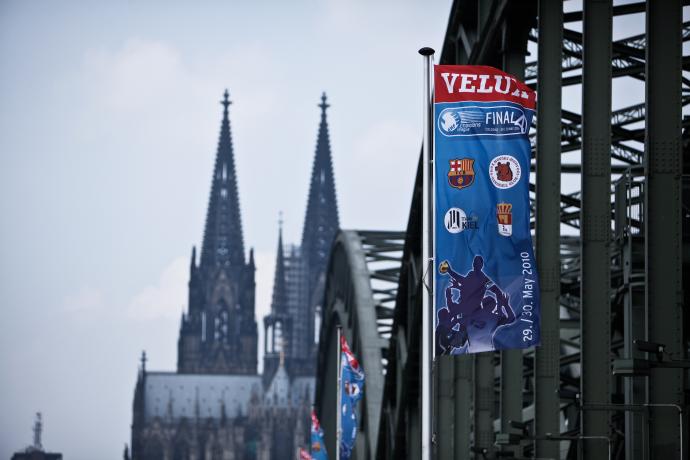The LANXESS Arena in Cologne has hosted seven sold-out VELUX EHF FINAL4 events so far.
The 2009/10 season was a launching pad for one of the most spectacular and successful innovations in European club handball since the EHF was founded in 1991.
In March 2009, the EHF Executive decided to adapt the playing system of the EHF Champions League to a new format, including a FINAL4 tournament. Three month later, the venue for the first ever EHF FINAL4 was unveiled, the premiere was to take place in Cologne, Germany.
And from that moment on, the LANXESS arena was ready to become a cathedral of handball. After hosting the knock-out stage including the final weekend of the 2007 World Championship with five times 20,000 fans in the arena and the highly successful EHF Champions Trophy in 2006, organised by VfL Gummersbach, negotiations had started.
Thomas Krämer had been involved in the preparations and organisation of the FINAL4 since the first minute, as director of the agency Stadionwelt, which besides the City of Cologne and the management of the LANXESS arena, is EHF’s main partner for the organisation of the event in Cologne.
“There were a lot of questions to be discussed prior to the decision to organise a FINAL4, including: Who is the official event organiser? What changes would it mean for the clubs? But from the Champions Trophy and several Champions League matches of VfL Gummersbach, the EHF knew the LANXESS arena very well. And thus, Cologne was chosen as the host for the event,” said Krämer.
THW Kiel, FC Barcelona, Ciudad Real and Medvedi Chekhov qualified for the first edition at the end of May 2010 - and ultimately it was Kiel, who were to become the first event winners of the FINAL4. Even from the first event a benchmark was set in the organisation of a major international handball event.
The event’s organiser, EHF Marketing GmbH, used this first event to give the Danish company, the VELUX Group, a platform to market their brand. A successful cooperation that last to this day, with the VELUX Group becoming title sponsor of the competition from the start of the 2010/11 season. The current contract runs through to 2020.
After the LANXESS arena was sold-out with nearly 20,000 fans, the EHF decided to continue the cooperation with Cologne - and extended the contract several times, including the current one, also valid until 2020.
From the 2011 event on, the former Austrian international David Szlezak became the new VELUX EHF FINAL4 manager. And constantly the quality of the event has been improved – especially in areas such as entertainment and VIP hospitality.
World stars from the world of music including ‘Europe’ in 2012, and stars from the German show “The voice of Germany” or the Swedish Eurovision Song Contest winner Mans Zelmerlöw have graced the stage in the LANXESS arena.
“But, the most important part of the event are still those four handball matches,” says Szlezak.
“In the first year it might have been a German event, as thousands of THW Kiel were among those 20,000,” says Krämer, “but since the second edition it has become much more of a European event.”
In 2012, an all-Spanish final between FC Barcelona and Ciudad Real decided the Champions League winner. “And it was the most impressive moment for me in all FINAL4 history that all 20,000 including thousands of Germans, created a highly emotional atmosphere and celebrated a huge handball party,” says Krämer.
In the last years, the nations represented among those ticket holders for the VELUX EHF FINAL4 have spread as has the list of participating teams.
“In terms of travel, Cologne is the perfect location with flight and train connections throughout all Europe,” says Krämer: “We are in the centre of Europe. For example, Barcelona have a shorter trip to Cologne than Kiel. And as we are a trade fair and congress city, the number of hotels is huge.”
Since the implementation in 2010, all VELUX EHF FINAL4 events received the sold-out award -and due to the increasing size of the event, the number of people involved grew rapidly.
“Including all arena staff, TV production and volunteers, approximately 2500 to 3000 people work in or around the LANXESS arena during the VELUX EHF FINAL4,” says Krämer.
His biggest concerns each year are connected with the trophy: “It would be the darkest hour if the trophy would be damaged before it is handed over. Due to so many side events, where the trophy is in use for numerous events including presentations with sponsors and autograph sessions with fans. We are extremely happy that nothing happened to this trophy so far.”
Those are the clubs, which have won the trophy so far:
THW Kiel (2010, 2012)
FC Barcelona (2011, 2015)
HSV Hamburg (2013)
SG Flensburg-Handewitt (2014)
Vive Tauron Kielce (2016)


 The City of Cologne will remain host of the VELUX EHF FINAL4 until at least 2020
The City of Cologne will remain host of the VELUX EHF FINAL4 until at least 2020